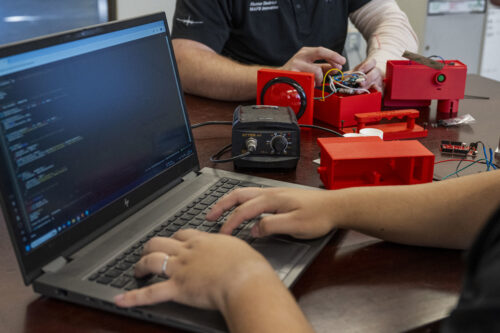In a move that could dramatically improve the KC-46A Pegasus’s alert response, the 22nd Air Refueling Wing’s Innovation Lab has developed and tested a remote start system for the troubled tanker. The system, known as the Auxiliary Power Unit Start System, or APRUSS, allows aircrews to start the KC-46 remotely using cellular signals. This innovation could close the readiness gap between the KC-46 and its predecessor, the KC-135 Stratotanker.

The APRUSS promises to be a game changer for the KC-46 fleet. By allowing crews to remotely start the aircraft’s engines and systems, the APRUSS significantly reduces the time it takes for the aircraft to be mission-ready. This eliminates the lengthy pre-flight procedures that previously hampered the KC-46’s responsiveness, particularly in time-sensitive alert scenarios.
The project is a testament to the Air Force’s growing embrace of grassroots innovation. The 22nd ARW Innovation Lab, working in partnership with FirePoint Innovation at Wichita State University, bootstrapped the initial development of the APRUSS. The project caught the attention of the National Security Innovation Network, which helped secure $250,000 in funding from the Defense Innovation Unit to continue development.
Staff Sgt. Hunter Diedrich, the NCOIC of the Innovation Lab, oversaw the design and construction of the prototype. Senior Airman Douglas Vargas, an intern at the lab, focused on the software that makes remote operation possible. The first operational test, conducted at McConnell, was a success. “We were relieved when the APRUSS worked the first time because we had a few unknowns if the actuator would be strong enough to press the button and if the unit was going to be able to stay on the aircraft,” Diedrich said.
The system is remarkably simple, using cellular signals to trigger a physical actuator that starts the aircraft. “The design can work anywhere in the United States using cellular signals,” Diedrich said. “We can trigger the APRUSS with a few seconds delay from states away.”
Now that the APRUSS has proven its worth in testing, the 22nd ARW Innovation Lab has partnered with PWI, a Wichita-based company, to refine the design, build prototypes, and eventually commercialise the system for the entire KC-46 fleet. “McConnell AFB is the only base that is working this concept, but it is anticipated that all KC-46 units will want this device once it is developed at a larger scale,” said Capt. Timothy Schwanke, chief of the 22nd ARW Innovation Lab.
The long-term goal is to field enough APRUSS units to equip every operational KC-46, with backups and spares available to ensure a high level of operational readiness.
For more information, hit the Source below